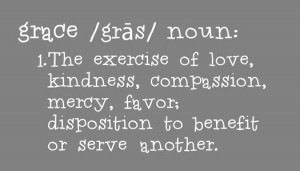Have you even reflected on what grace means? Do you live and model a life full of grace? While in church yesterday, the word grace graced the sermon multiple times and inspired me to jot a few notes down to reflect upon afterwards. I realized that grace extends beyond the church walls and religious readings; that it has a very necessary place in our everyday lives regardless of religion. While listening, I realized grace can be a difficult concept for kids to grasp, nevertheless a very necessary concept.
Grace is essential for growth in self-awareness, confidence, hospitality, and emotional wellbeing. Grace is also essential in parenting our children, so that they feel feel loved no matter the circumstances. When we offer our children grace after they have wronged, we converse over the matter rather than reactively punishing and perhaps sending them off to their rooms without proper dialogue. Ultimately our children want to feel loved, and grace offers them that and so much more. Now, I totally understand that grace can run out and phones have to be taken away, but at least try parenting with grace first and foremost. One day you will receive grace in return and will know you have modeled and passed on an invaluable lifeskill.
So what exactly is grace?
Grace is something you receive or give to others, a gift; one that you don’t expect or need anything back in return. Grace is being able to reach out and accept it from others with an open heart and mind. It is also important to recognize when grace is being received, so it is not taken for granted. Some examples of grace are:
– Strength
– Forgiveness
– Unconditional love
– An unmerited favor
– Not getting what you deserve but being okay with the outcome
– Extending one’s self to those who may have wronged you
– Ignoring someone’s poor behavior towards you
– Understanding
– Hospitality
– Patience
What does the opposite of grace look like?
After discussing the meaning of grace, ask your child what the opposite of grace is. What thoughts and actions go against the grain of grace; for example,
– Judgement
– Bullying
– Hatred
– Jealousy
– Stealing
– Lying
– Being selfish
– Name-calling
– Hitting
– Gossiping
The next time your child feels the urge to express or use any of the above, show them how to use grace instead. When we honestly put all of the above aside, we lift others while lifting ourselves.
With so much focus on academics, we sometimes fall short on teaching our kids life skills like grace. Homework takes the place of learning life’s day-to-day essential skills, sports takes the place of bettering interpersonal skills, and other activities take the place of actually sitting down and having a meaningful conversation. When you lean away from these everyday distractions once in a while and intentionally lean towards life skills, you achieve a more well-rounded child with greater emotional wellbeing. Emotional well-being is what ultimately takes them the distance and sets the stage for positive relationships and interactions.
How can you extend grace today? How can you show your child what grace looks like?




3 comments
Gracefully written and appreciated
Beautiful…this is what I want in my classroom…
Thank you so much for reading and commenting, Sue.